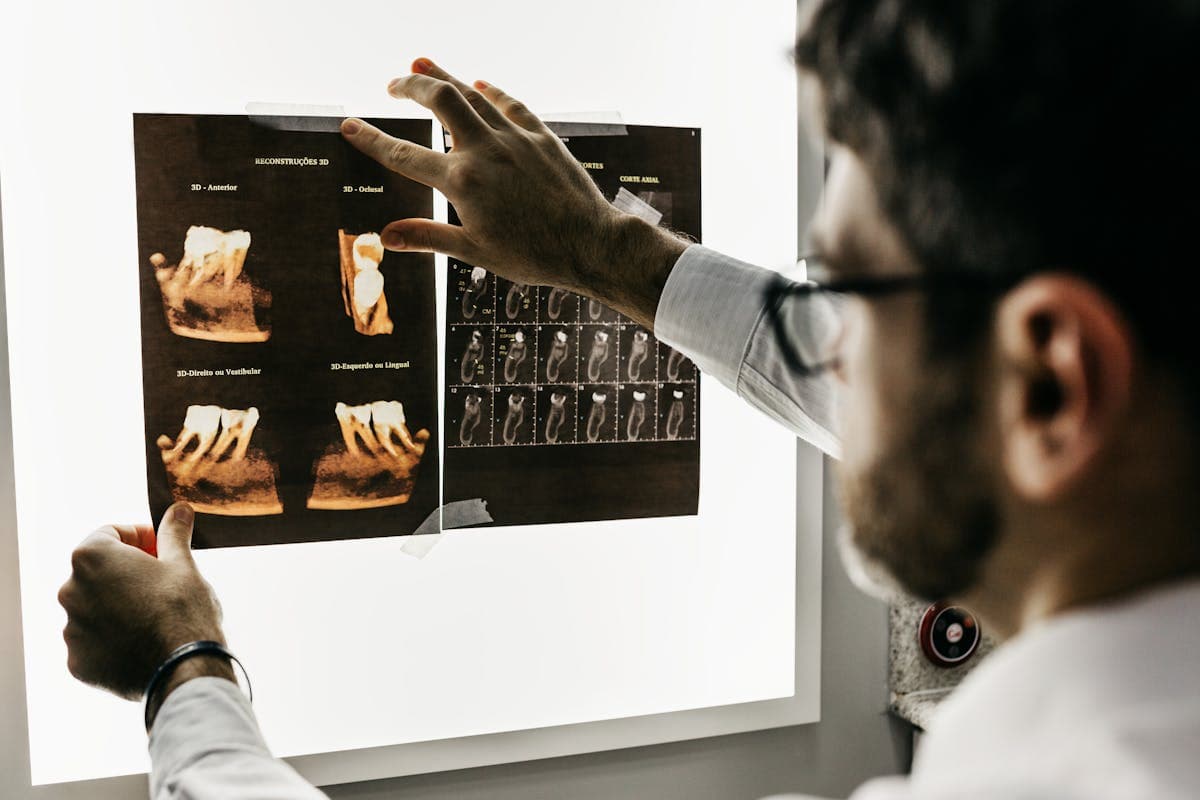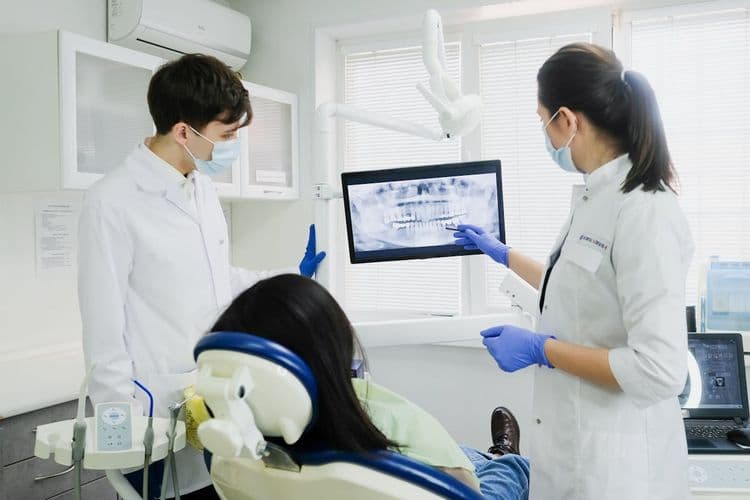In the domain of oral healthcare, the roles of a general dentist and a prosthodontist might seem to overlap, yet they are inherently distinct. General dentists tend to be the first line of defense, diagnosing and treating common dental issues and providing preventative care. On the other hand, prosthodontists, with their specialized training, focus on the restoration and replacement of damaged or missing teeth, often tackling more complex cases. This brief overview only scratches the surface of the differences, leaving much room for further exploration and understanding.
Understanding the Dental Profession
The dental profession, a crucial sector in healthcare, encompasses a myriad of specialties, each with its own unique focus and expertise. These dental specialties include but are not limited to orthodontics, pedodontics, periodontics, endodontics, and prosthodontics. Each specialty is distinguished by its own set of skills and knowledge, contributing to the overall patient care. For instance, an orthodontist focuses on aligning teeth and jaws, while a prosthodontist specializes in the replacement of missing teeth. The aim of these specialties is not confined to treating oral diseases but extends to improving oral health, enhancing aesthetic appeal, and boosting patient confidence. Therefore, understanding the various dental specialties is essential to seek the most appropriate dental care.
What Is a Dentist?
Dentistry, as a field, is primarily spearheaded by general dentists, professionals who are extensively trained to care for the overall oral health of their patients. Their roles encompass a wide range of services that fall under general dentistry, including but not limited to preventive services, restorative services, cosmetic procedures, and overall health concerns.
An essential part of their responsibility is diagnosing and managing dental health, which often involves conducting routine check-ups, cleanings, and x-rays. In addition, they work on treating problems such as cavities and tooth decay.
While they can cater to various dental needs, dentists may also refer patients to dental specialists for advanced procedures, thereby highlighting the critical interconnection between general dentistry and dental specialties.
Dentist’s Education and Training
In the pursuit of becoming a dentist, rigorous education and extensive training are paramount. This begins with an in-depth curriculum in dental school, followed by postgraduate training to further refine their skills and knowledge. Furthermore, dentists are required to engage in ongoing education throughout their career to stay abreast of the latest advancements in dental science and patient care methodologies.
Dental School Curriculum
Earning a degree in dentistry demands rigorous academic preparation and practical training. The dental education pathways consist of a pre-dental undergraduate degree, typically in science, followed by four years in dental school. The curriculum includes basic sciences, oral biology, and clinical sciences. The first two years focus on theoretical knowledge in biochemistry, physiology, and anatomy, supplemented by laboratory simulations. The latter part of the program emphasizes clinical training requirements where students apply their knowledge in treating patients under supervised settings. This phase guarantees students gain hands-on experience, developing their diagnostic skills and understanding of various dental procedures. The curriculum’s design guarantees an all-encompassing education, equipping students with the necessary skills to practice general dentistry.
Postgraduate Dental Training
Upon completion of dental school, graduates often pursue additional training through postgraduate programs to specialize in specific dental fields. This postgraduate dental training allows them to refine their skills and gain expertise in advanced techniques. These programs, which may last from two to six years, vary depending on the specialty being pursued.
One of the key objectives of postgraduate dental training is to equip dentists with the necessary skills for patient rehabilitation. This could involve complex restorative procedures, oral surgery, or the management of oral diseases. Through these programs, they also learn to navigate the intricacies of patient interactions and management. Overall, postgraduate dental training serves as a stepping stone for dentists to become specialists in their respective fields.
Continuing Education Requirements
Continuing education is a critical component in a dentist’s career, as it guarantees they stay up-to-date with the latest advancements and techniques in dental care. It’s not just about maintaining licensure; it’s about securing the highest quality of care for patients.
The exact continuing education requirements can vary by state, but typically, dentists need to complete a certain number of hours in a given time frame. Some states may also require specific courses, like those in infection control or ethics.
Continuing education can take many forms, including seminars, workshops, and online courses. It’s seen as an investment in professional development, underlining a dentist’s commitment to their field. Continuous learning secures they are prepared for the ever-evolving world of dentistry.
Role and Responsibilities of a Dentist
In the field of dental healthcare, dentists hold a pivotal role characterized by a wide range of responsibilities. Their primary duties encompass diagnosis and treatment of oral health issues, ranging from cavities to gum disease. Additionally, they are skilled in performing specialized dental treatments, consequently extending their role beyond routine care, into the domain of advanced dental procedures.
Dentist’s Primary Duties
Delving into the core responsibilities of a dentist, they primarily focus on diagnosing and treating issues related to a patient’s teeth, gums, and other parts of the mouth.
- Preventive Care: Dentists prioritize preventive care, implementing strategies to help keep dental diseases at bay, such as routine cleanings and oral exams.
- Diagnosis: They diagnose oral health conditions using equipment like X-rays, ensuring early detection of potential issues.
- Oral Hygiene Education: Dentists play an essential role in educating patients about the importance of maintaining oral hygiene, offering advice on brushing, flossing, and dietary habits.
- Treatment: They treat a range of dental issues, from cavities to gum disease, providing relief and improving patients’ overall oral health.
Dentists play an essential role in maintaining our oral health, ensuring smiles are not only beautiful but healthy too.
Specialized Dental Treatments
While general dentistry focuses on routine procedures and preventive care, the field also encompasses a range of specialized dental treatments, highlighting the extended role and responsibilities of a dentist. These treatments often involve advanced techniques and materials, including cosmetic procedures and tooth restoration. Cosmetic procedures can range from teeth whitening to veneers, improving the aesthetic appearance of a patient’s smile. On the other hand, tooth restoration involves repairing damage or decay, with treatments such as fillings, crowns, or implants. In both cases, the dentist’s role extends beyond basic care, requiring an extensive understanding of dental materials, techniques, and patient needs. This illustrates the broad scope of dentistry and the intricate specialization it can entail.
Defining a Prosthodontist
Prosthodontists represent a specialized branch of dentistry, focusing on oral prostheses designed to replace missing teeth, correct abnormalities, and improve the overall aesthetics and functionality of a patient’s mouth.
This branch of dentistry is not just about providing solutions for oral health issues, it also encompasses the emotional well-being of patients. Prosthodontists play a critical role in restoring confidence and self-esteem through improved oral health. Their qualifications and specialties are vast. For better understanding, consider the following:
- Prosthodontists complete an additional three to four years of specialized training after dental school.
- They focus on complex dental issues, including full mouth rehabilitation.
- Prosthodontists have a deep understanding of everything that goes into a functional, natural-looking smile.
- Their expertise includes crowns, bridges, dentures, and dental implants.

Prosthodontist’s Specialized Training
Specialized training sets prosthodontists apart in the field of dentistry. They undergo extra years of postgraduate training after dental school, focusing on the restoration and replacement of damaged or lost teeth. This rigorous education, centered on advanced techniques, equips them with the necessary clinical expertise to handle complex dental conditions. The curriculum involves an in-depth exploration of materials science, understanding the interaction of dental materials with the body, and developing proficiency in the use of innovative digital technology for precise diagnosis and treatment planning. This specialized training also includes extensive hands-on clinical experience, honing their skills in a variety of procedures. Ultimately, a prosthodontist’s advanced training fosters a thorough understanding of oral health needs, enabling them to provide superior care.
Job Duties of a Prosthodontist
Delving into the domain of prosthodontics reveals a plethora of responsibilities that these specialized professionals bear.
- Foremost, they are experts in the creation and fitting of dental implants, replacing missing or damaged teeth with precision-crafted, bio-compatible prosthetics.
- Prosthodontists are also the trusted authority in cosmetic restoration, focusing on enhancing the aesthetic appearance of patients’ smiles.
- Their duties extend to designing and implementing treatment plans for complex dental conditions, often involving multiple dental specialties.
- Additionally, they provide rehabilitative services for patients suffering from oral cancer, traumatic injuries, or developmental abnormalities.
In essence, prosthodontists play an integral role in restoring oral function and aesthetics, thereby greatly improving the quality of life for their patients.
Key Differences Between Prosthodontist and Dentist
While both prosthodontists and general dentists contribute to oral healthcare, there are key differences in their education, expertise, and clinical focus that set them apart. Prosthodontists undergo additional three years of training after dental school, specializing in prosthodontic procedures like dental restoration, crowns, bridges, and dentures. Their expertise lies in treating complex dental conditions and restoring ideal function and aesthetics to a patient’s smile.
On the other hand, general dentists provide a broad range of services that cater to routine oral health needs. They conduct regular check-ups, cleanings, fillings, and basic dental procedures. The primary difference lies in the complexity of cases handled with prosthodontists often working on intricate dental restorations. Consequently, education, specialized training, and clinical focus create a clear distinction between these two professions.
Frequently Asked Questions
What Are the Average Salaries for a Prosthodontist and Dentist?
The salary comparison for a prosthodontist and dentist varies. The average earnings of a dentist are approximately $155,600 annually, while a prosthodontist typically earns higher, averaging around $191,400 per year.
Can a Dentist Perform the Tasks of a Prosthodontist?
While a general dentist possesses broad capabilities in oral healthcare, the specialized expertise of a prosthodontist enables them to perform complex restorative and replacement procedures that may be beyond a general dentist’s scope of practice.
What Is the Process of Becoming a Prosthodontist After Dentistry?
The process of becoming a prosthodontist following dental school involves additional specialized prosthodontist training. This typically includes a three-year dental residency focused on restorative procedures and the replacement of teeth.
Are There Specific Conditions That Only a Prosthodontist Can Treat?
Yes, specific treatments require a prosthodontist’s expertise. Complex prosthodontic cases like full mouth reconstructions, treating facial abnormalities, and managing patients with congenital disorders are generally handled by prosthodontists due to their advanced training.
What Are the Career Advancement Opportunities for a Prosthodontist and Dentist?
Career advancement opportunities for both prosthodontists and dentists include practice ownership, academic careers, and further specialization. They may also advance into research or administrative roles within dental healthcare organizations. Each path offers unique rewards and challenges.


